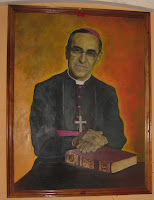By: Gabriela Flora, AFSC
Today Salvadorans and people across the world will commemorate the life and legacy of Monseñor Romero on the 30th anniversary of his assassination as we did last night during a snow storm here in Denver.
Many priests (in addition to thousands of civilians) were murdered in El Salvador by the military government funded and trained by the United States. Romero stands out because he was part of the oligarchy, entrenched in the power of the church and state. He was chosen as archbishop of San Salvador in 1977 because it was believed that he would tout the conservative government line, rein in the priests supportive of the working class, and turn a blind eye to the violence in the name of “fighting communism”. Romero’s career was taking off in the conservative hierarchy of the church. But the injustice of what he witnessed led him to risk it all to the point of death to speak out against inequality, exploitation, injustice and extreme violence.
I had the privilege this past January to spend eleven days in El Salvador with students from the Romero House at Regis University. The trip was a pilgrimage exploring the life and legacy of Archbishop Romero, the reality of military rule and support of the U.S. in the devastation and the current reality of an FMLN president and hope for a better future. Woven into all of this was the underlying current of immigration.
Beginning with a visit to Divina Providencia, Archbishop Romero’s home and church where he was assassinated to the site of his tomb, Romero’s spirit accompanied us as we met the Salvadoran people and learned of their experiences in the war and have they have coped since the peace accords.
Monseñor Romero’s spirit is a transformative one. The final act that led Archbishop Romero to no longer accept the justification and rhetoric of the government and military was the assassination of his dear friend Father Rutilio Grande, a priest who lived amongst the people and supported them in their daily struggles against violence, both economic and physical (as the two were intimately tied together). After Father Grande’s murder, Romero refused to turn a blind eyeto the violent realities in Salvadoran poor communities; he refused to officiate at any government sanctioned event and became a spokesperson of what the people were witnessing in their communities. On his weekly radio program he described the atrocities experienced by his parishioners and name the murderers; a powerful act in a country where all media was controlled by the economic elite.
Romero’s transformation is central to his legacy. 
During my time in El Salvador I saw Romero’s compassion and grace in the eyes of Jonathan, Rogelio and Angélica among many others. Jonathan went to the mountains at the age of 12 to join the guerillas after his brother was disappeared. He shared how, after the peace accords he worked with all those who disarmed (FMLN and military) to obtain training and access to services. When I asked him if it was hard to work with the former rank and file military men, he said it was at first, but then he realized they were poor like him and in the same situation (although the former military were given prime land and easier access to credit than former FMLN).
Rogelio was nine years old when his whole community was massacre. We sat at the site of his former community and Rogelio shared the horrors he experienced and saw when the Atalcatl brigade trained at the School of the Americas killed 150 people including all his immediate family in front of his eyes. His humble expression of the atrocities was beyond words. Our time at the site ended by holding hands in a circle and praying for peace.
Angelica, our host at the home we stayed at in Papaturro told of why she and her community had to flee to refugee camps in Honduras. She told
Commemorating Romero’s assassination and more importantly his life, is not just to remember the terrible injustices in El Salvador and role the US played, but to carry Romero’s spirit with us as we work to change the current policies, beliefs and institutions that maintain countries like El Salvador at levels of inequality similar to pre-war numbers. Part of what draws me to AFSC, is that our work is based in an understanding that economic injustice is at the root of most violence in our world today and that peace is not the absence of war, but rather is rooted in economic justice and the full respect of all people’s human rights. I am proud to be part of an organization that carries on Romero’s spirit.
The Romero Theater Troupe performing scenes from Archbishop Romero's life at the Denver 30th Anniversary Commemoration of Oscar Romero's Life and Death in Denver on March 23. The event was sponsored by: American Friends Service Committee, Denver Catholic Worker, Denver Justice and Peace Committee, Loretto Community, Project Salvador, and Spirit of Christ Catholic Church.
Listen to an interview with Gabriela Flora and Jim Walsh (Gabriela's husband and founder of the Romero Troupe) on KGOAT radio this past Saturday Experiences in El Salvador Shed Light on the Root Causes of Immigration http://www.kygt.org/audio/Jerry/2010/Jerry%203-20-10.mp3
Listen to yesterday's KGNU interview on Romero's life, death and the current situation in El Salvador with Gabriela Flora, Jim Walsh, Arnie Carter (member of Romero Troupe and AFSC's Area Program Committee) and Christina Stimson (program manager for Project Salvador).
Wednesday, March 24, 2010
Monseñor Romero’s Legacy Lives On
Subscribe to:
Post Comments (Atom)






1 comment:
Thanks Gabriela for giving such a clear history of both Monsenor Romero's life and of the amazing people in El Salvador who are insipred by him.
Post a Comment